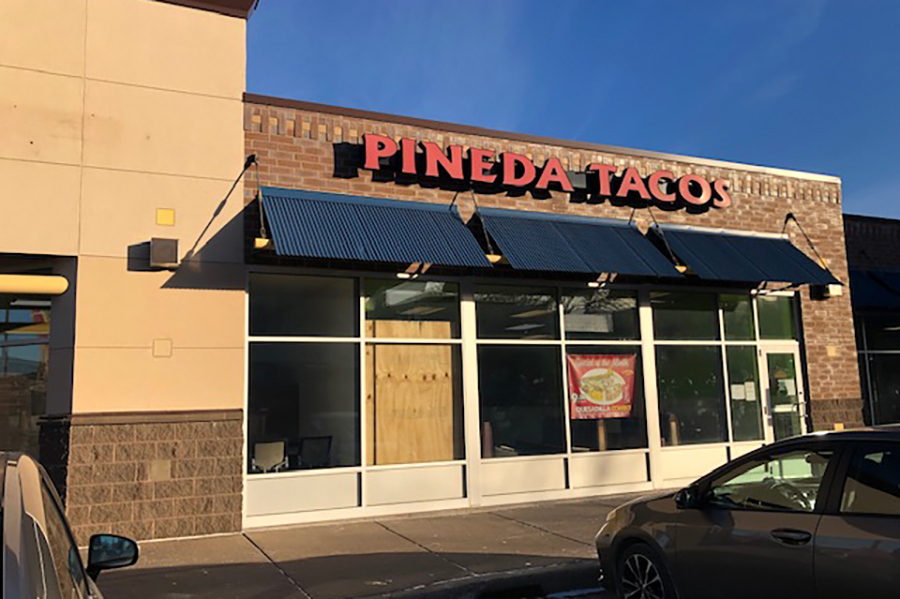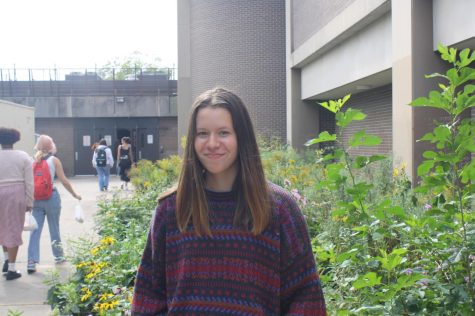Lake Street businesses struggle to stay open in the midst of pandemic
Located on East Lake Street, Pineda Tacos offers a wide selection of Mexican food for an affordable price. They are famous with South students with their ‘Tiger Burrito’ named specially for South.
January 5, 2021
In the midst of a pandemic, as well as the aftermath of the George Floyd protests, many Lake Street businesses are struggling to remain open.
As you drive down Lake Street, you might notice the significant decrease in people wandering the streets and buildings that are still boarded up, while others are burned down.
When walking into Pineda, a once bustling restaurant that serves tacos and other Mexican cuisine close to South, it is now significantly quieter. You may hear the sound of Spanish music playing, see tables pushed aside and smell fresh food wafting through. Nine months ago, lines were out the door. Now takeout and delivery are often the only options for restaurants and businesses.
Eduardo Lopez Pineda, a worker at Pineda, recounts his story of the pandemic. He was going to culinary school as well as working another job when the pandemic hit. He got laid off, and his brother asked him for some help around the restaurant. Lopez Pineda has hopes of making good food for people to eat, and his challenge is to “make you come back because the food is going to be so great.”
Pineda has also had to cut down on employees. When one shift used to be four people, it is now two or three. This means that income is 25 percent of what it used to be. “Sure we can [remain open], yes. But for how long?” Lopez Pineda said on how keeping the restaurant open would be possible. This is also a question for many other businesses; it is a matter of how long they will be able to stay open.
Another business on Lake Street with the same worries is Moon Palace Books. They are open for delivery and at partial capacity. They were not greatly affected by protests, although Angela Schwesnedi, owner of the store, said, “There are little things for us, with the post office being gone, and with pickup shipping takes longer…a lot of what makes a small business successful is the neighborhood and the community and anytime we lose a business it makes things a lot harder for the rest of us. We are all in this together in a way.”
South students have also felt the absence of vibrant business on Lake Street. Going out to lunch was a valued tradition for many students before the pandemic. “Mostly I miss my friends because I would always go with my friends at lunch,” said Tabitha Cowan, a junior at South who went out to lunch before the pandemic. Going out to lunch for many students was a fun way to catch up with friends, and a major part of the day. That is now something that is simply not available, something that along with many other things the pandemic has taken away.
Lopez Pineda emphasized the importance of following health guidelines to help businesses like his. “I would say the best kind of support, not only for us but for everyone is mask, [and] keep your distance. Hand washing should not just be a thing right now. It should be a thing of way before and should be a thing of way after,” he said.
This is a worldwide struggle for small businesses struggling to stay afloat during lockdown. The national stimulus check, a 600 dollar paycheck, helps for those that are struggling with the pandemic. It has been helpful for many, although it has not been quite enough. “It was a lot easier for everybody I think when people were getting a little extra, that 600 dollars a week. Once that stopped, our sales really slowed, and that’s true for a bunch of people,” Schwesnedi said.
According to a US Chamber of Commerce report, 57 percent of small businesses are concerned about having to close permanently and another 70 percent are concerned about financial adversity.
The last months have left a strain on many, with some just wanting to see friends and go out for lunch, others living paycheck to paycheck and making health compromises, and others struggling to keep their business afloat. However, people are still offering support to those that need it. Many people are making efforts to shop and invest in local businesses. “It’s hard right now. We really appreciate it when people can spend their money in a local business. We want to be here when it’s over,” said Schwesnedi.






